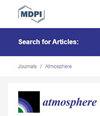The Drawback of Optimizing Air Cleaner Filters for the Adsorption of Formaldehyde
IF 2.5
4区 地球科学
Q3 ENVIRONMENTAL SCIENCES
引用次数: 0
Abstract
Air cleaners with activated carbon (AC) filters for the adsorption of gaseous pollutants are often used to improve indoor air quality. As formaldehyde is a common and health-relevant indoor air pollutant, many testing standards for air cleaners, such as GB/T 18801:2015, require the cleaning efficacy to be tested with this substance. This often persuades manufacturers to optimize the employed filters specifically for formaldehyde. However, in regions where indoor formaldehyde levels are far below the guideline values, other gaseous pollutants might be more relevant. Thus, the question arises of whether the optimization for formaldehyde can have a negative impact on the adsorption of other gases. To address this question, the clean air delivery rate (CADR) of an air cleaner was determined for different test gases with either a standard AC filter or an AC filter modified for improved formaldehyde adsorption. Although the modified AC filter performed substantially better for formaldehyde, a strong reduction in the CADR was observed for toluene and nitrogen dioxide. This is a drawback for situations in which these gases are more problematic than formaldehyde. The findings suggest using either specialized filters for different applications or blends of different adsorbants to find the best compromise for the most relevant pollutants.优化空气净化器过滤器以吸附甲醛的缺点
带有吸附气态污染物的活性炭(AC)过滤器的空气净化器通常用于改善室内空气质量。由于甲醛是一种常见的、与健康相关的室内空气污染物,许多空气净化器测试标准(如 GB/T 18801:2015)都要求用这种物质来测试净化效果。这通常会说服制造商专门针对甲醛对所采用的过滤器进行优化。然而,在室内甲醛含量远低于指导值的地区,其他气体污染物可能更重要。因此,针对甲醛的优化是否会对其他气体的吸附产生负面影响就成了问题。为了解决这个问题,我们使用标准交流过滤器或为改善甲醛吸附而改良的交流过滤器,针对不同的测试气体测定了空气净化器的洁净空气输送率(CADR)。虽然改良型交流过滤器对甲醛的吸附效果要好得多,但对甲苯和二氧化氮的 CADR 却大大降低。在这些气体比甲醛更容易产生问题的情况下,这是一个缺点。研究结果表明,可以针对不同的应用使用专门的过滤器,或混合使用不同的吸附剂,以找到针对最相关污染物的最佳折中方案。
本文章由计算机程序翻译,如有差异,请以英文原文为准。
求助全文
约1分钟内获得全文
求助全文
来源期刊

Atmosphere
METEOROLOGY & ATMOSPHERIC SCIENCES-
CiteScore
4.60
自引率
13.80%
发文量
1769
审稿时长
1 months
期刊介绍:
Atmosphere (ISSN 2073-4433) is an international and cross-disciplinary scholarly journal of scientific studies related to the atmosphere. It publishes reviews, regular research papers, communications and short notes, and there is no restriction on the length of the papers. Our aim is to encourage scientists to publish their experimental and theoretical research in as much detail as possible. Full experimental and/or methodical details must be provided for research articles.
 求助内容:
求助内容: 应助结果提醒方式:
应助结果提醒方式:


